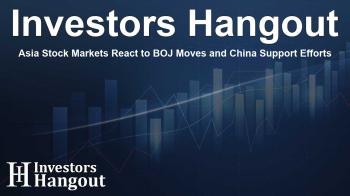Asia Stock Markets React to BOJ Moves and China Support Efforts

Asian Stock Markets on an Upward Trend
As of late, Asian stocks have been showing signs of recovery, inspired by record levels on Wall Street and a sense of optimism stemming from expected policy support in China. However, many investors remain cautious, particularly with an important meeting on monetary policy looming with the Bank of Japan (BOJ). This cautious sentiment appears to have affected trading decisions across the region.
The recent highs recorded by the U.S. indices, particularly the S&P 500, have influenced investor sentiment significantly. This positivity, coupled with expectant remarks about lowered interest rates by a prominent political figure, has led to a more favorable outlook on Asian markets.
Focus on Bank of Japan's Potential Rate Hike
Investors are significantly interested in the upcoming BOJ meeting, anticipating a potential interest rate hike. Major Japanese indices, such as the Nikkei 225 and TOPIX, have both exhibited favorable movements of 0.8% and 0.7%, respectively, largely supported by advancements in technology stocks.
These indices appear to have gained between 3% and 5% during the week, indicating that many analysts believe any adjustments to rates have already been priced into the market. This speculated hike, pegged to be around 25 basis points, is largely attributed to the recently released consumer price index data which indicates inflation is on the rise.
While higher interest rates typically carry implications that could dampen market enthusiasm, they also display a growing belief in Japan's economic recovery, particularly from sectors inclined toward domestic demand.
However, the manufacturing sector has shown concerning trends, evidenced by a Purchasing Managers' Index that confirms contraction for the seventh consecutive month. Conversely, services in Japan appear to be rebounding significantly, suggesting a mixed outlook ahead.
Chinese Stocks Respond Positively to Policy Changes
China is witnessing optimistic trends in its stock market, anchored by governmental moves to provide more substantial support for local companies and equities as they confront the ramifications of evolving trade tariffs.
The Shanghai Shenzhen CSI 300 and Shanghai Composite indexes showed rises of 0.7% and 0.4% respectively. Meanwhile, Hong Kong's Hang Seng index thrived particularly well, posting a remarkable increase of 1.7%, encouraging hope among investors who see potential benefits of recent U.S. export constraints boosting local tech demand.
The positive sentiment is significantly aided by new directives from the Chinese government urging state-affiliated financial entities to increase their market involvement, enhancing confidence among investors. Nevertheless, potential trade tariffs on Chinese imports are looming over market sentiments despite the uplifting news.
Investors should note that next week will see a temporary halt in trading activities in China due to the Lunar New Year holiday, but key economic indicators, including January's PMI data, are expected to be released shortly, which could add further context to the situation.
General Outlook for Asian Markets
Despite some mixed signals, the broader Asian markets mainly tilted upward. In Australia, the ASX 200 index rose by approximately 0.5% this week, although it faced challenges as recent PMI data suggested struggles in business activity.
Promising developments in the chipmaking sector, fueled by expectations surrounding a substantial investment in artificial intelligence in the United States, have contributed positively to South Korea's KOSPI, which advanced by about 0.8%.
In a slightly contrasting scenario, Singapore's Straits Times index reported a minor dip after the Monetary Authority made decisions that relaxed monetary policy for the first time in three years in response to economic projections that indicated slower growth. However, predictions also signal a decrease in inflation rates.
The Indian market appears to be in a state of flux, with the Nifty 50 index anticipated to open flat, marking a lengthy stagnation near its seven-month lows as it grapples with a multitude of economic pressures.
Frequently Asked Questions
What recent factors are influencing Asian stock markets?
Recent high performances in U.S. stock markets and anticipated policy support from China are positively affecting Asian markets.
What is the expected outcome from the BOJ meeting?
The Bank of Japan is largely expected to raise interest rates by 25 basis points, reflecting confidence in the local economy despite mixed signals from the manufacturing sector.
How are Chinese stocks performing lately?
Chinese stocks, particularly indices like the Shanghai Composite, have experienced positive movements, driven by government initiatives to bolster domestic equity markets.
How do trade tariffs influence Asian market sentiment?
Potential trade tariffs can generate apprehension among investors; however, news of supportive policies can offset some negative effects.
What should investors watch in next week's trading?
Investors should be attentive to upcoming PMI data releases and the impact of the Lunar New Year holiday on trading activities in China.
About Investors Hangout
Investors Hangout is a leading online stock forum for financial discussion and learning, offering a wide range of free tools and resources. It draws in traders of all levels, who exchange market knowledge, investigate trading tactics, and keep an eye on industry developments in real time. Featuring financial articles, stock message boards, quotes, charts, company profiles, and live news updates. Through cooperative learning and a wealth of informational resources, it helps users from novices creating their first portfolios to experts honing their techniques. Join Investors Hangout today: https://investorshangout.com/
Disclaimer: The content of this article is solely for general informational purposes only; it does not represent legal, financial, or investment advice. Investors Hangout does not offer financial advice; the author is not a licensed financial advisor. Consult a qualified advisor before making any financial or investment decisions based on this article. The author's interpretation of publicly available data presented here; as a result, they should not be taken as advice to purchase, sell, or hold any securities mentioned or any other investments. If any of the material offered here is inaccurate, please contact us for corrections.
